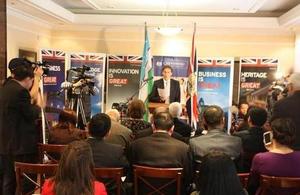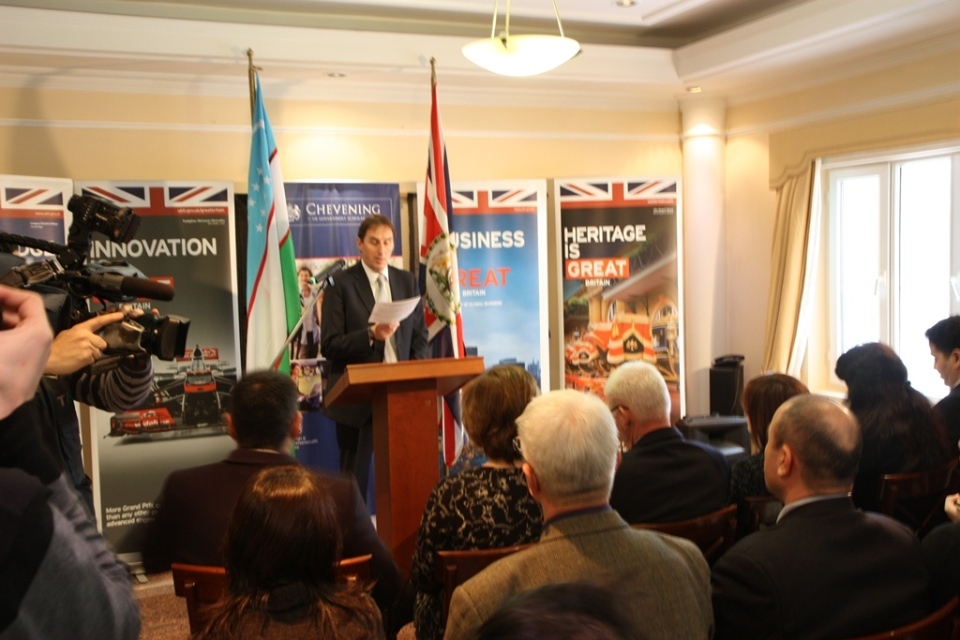The British Embassy in Tashkent sums up the 2013 activity results
On 31 January British Ambassador to Uzbekistan hosted a press conference where he spoke about the activity of the British Embassy last year.

The British Embassy in Tashkent sums up the 2013 activity results
Ambassador Edgar briefed Uzbek and foreign journalists about the main achievements of UK-Uzbekistan co-operation and spoke about successful projects of the British Embassy in the fields of politics, trade and investment, education and culture in 2013.
Ambassador Edgar described last year as fruitful in developing bilateral co-operation in the political sphere. The Senior Minister of State at the Foreign and Commonwealth Office, Baroness Warsi visited Tashkent in June 2013 and in November 2013 Minister of Foreign Affairs of Uzbekistan Mr Abdulaziz Kamilov visited London. Both visits supported mutual respect and understanding. Minister Kamilov’s visit was the first time a Foreign Minister of Uzbekistan had visited the UK since 2002 and took place at the invitation of the UK Foreign Secretary. During his visit, Minister Komilov met the UK Foreign Secretary William Hague and other British Government officials and members of the British Parliament. In the framework of the meetings they discussed a wide range of topics such as deepening bilateral co-operation in the fields of politics, trade and investment, education, human rights and regional security.
Ambassador Edgar also spoke about his trips to different regions of Uzbekistan in 2013 including Bukhara, Khorezm, Andijan, Namangan and Fergana regions, where he met local authorities, representatives of regional chambers of commerce and industry and other officials. In the course of such meetings the Ambassador was informed of socio-economic development and investment opportunities in the regions.
The British Embassy also worked towards strengthening the links between two parliaments. In May 2013, Lord John Waverley, Chairman of the All-Party Parliamentary Group “Britain - Uzbekistan” visited Uzbekistan. In the Senate of Oliy Majlis, Lord Waverley discussed the development of parliamentary links. In February 2013, with the assistance of the British Embassy in Tashkent two parliamentary clerks from the Senate and the Legislate Chamber Administration visited the British Parliament. This was an unprecedented exchange which enabled the officials of Oliy Majlis to study the British parliamentary democracy and the work of the House of Lords and the House of Commons Administration.

The British Embassy in Tashkent sums up the 2013 activity results
Whilst speaking about the co-operation in the field of trade and investment, Ambassador Edgar said that the trade turnover between two countries reached USD 82 million for the three quarters of 2013 (statistics for the 4th quarter of 2013 will be published in February 2014). UK export value reached USD 61 million and import value USD 21 million. These figures could be much better however, and as the Ambassador noted, there is huge unrealized potential in bilateral trade relations. The UK and Uzbekistan hold annual consultations in the margins of Uzbek-British Trade and Industry Council (UBTIC) and it has met in alternate capitals since 1994. The 20th anniversary meeting of the UBTIC took place at the Foreign and Commonwealth Office in London on 21 November 2013. More than 100 delegates attended the event including entrepreneurs, company officials, university representatives and also ministers and other officials. Parties discussed the development of investment opportunities in diverse sectors.
The Ambassador touched upon Uzbek-British co-operation in the field of education. The British Council has implemented a range of projects in cooperation with universities and ministries throughout the country. This organisation extended assistance to the Ministry of Higher and Secondary Special Education and the Ministry of Public Education in implementing the Decree of the President of the Republic of Uzbekistan “On measures to further improve foreign language learning system” which became a fundamental document while developing the language learning in Uzbekistan in 2013.
The British Embassy in Tashkent also implemented a number of interesting educational projects in 2013. Since 1995 talented young specialists from Uzbekistan have had an opportunity to continue their postgraduate studies in top British universities through the British Government’s Chevening Scholarship Programme. All alumni of the programme are now well-placed and contribute to the development of their country. In 2013, after a rigorous selection process the scholarships were awarded to two outstanding specialists of the Ministry of Foreign Economic Relations and the Institute of Macroeconomic Research and Forecasting of Uzbekistan. They are currently pursuing their Master’s degrees in the City University of London and Birmingham University.
The Ambassador noted that his brightest experience of interacting with the Uzbek youth in 2013 was the Model G8 Project, organised by the British Embassy in April 2013. Sixteen students from leading universities in Tashkent took part in a simulation of a G8 Summit (the real summit took place in the UK in June 2013). Students did a great job in playing the role of the eight biggest economies’ leaders when they suggested proposals for solving transnational problems. The UK Foreign Secretary wrote a letter to the Model G8 participants noting Uzbek students’ participation in the interesting educational project.
Among the cultural projects Ambassador Edgar mentioned the concert of the British classical music in State Conservatoire of Uzbekistan. This was organized by the British Embassy in Tashkent in May 2013 under the “Uzbekistan-Britain Friendship Society” with the support of the Rio Tinto Mining and Exploration ltd. The symphony orchestra consisted of students of the Conservatoire: 70 young talented Uzbek musicians and conductors. Among the musicians there was a British diplomat – a British Embassy official who joined the orchestra and played the cello.
Ambassador Edgar mentioned the increasing number of contacts between the two countries. The UK remains one of the most popular destinations for Uzbek tourists, students and businessmen. According to the British Embassy Visa Section, in 2012 they issued 1500 different types of British visas for the residence of Uzbekistan. The figures increased for more than 60% in 2013. The Visa Section issued more than 2400 visas in 2013.
After his speech Ambassador Edgar took questions from journalists.
Updates to this page
-
Added translation
-
Added translation
-
First published.